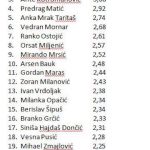The measures should have been be stronger and more ambitious MP Marin Lerotić of the Istrian Democratic Party (IDS) and MP Miro Bulj of the Bridge party said during a debate on draft amendments to the Investment Stimulation Law, which introduce new measures to curb the consequences of the pandemic.
The draft amendments will enable the awarding of investment subsidies to enterprises that did not have any difficulties until 31 December 2019 but were faced with difficulties in doing business in the period from 1 January to 30 June 2020.
Businesses that receive subsidies for investment projects whose implementation coincided with the start of the pandemic will be able to prolong their implementation for one year.
“Extending the deadline for projects from one to two years is possible if that is put up as a motion, we can do that,” state-secretary in the economy ministry, Nataša Mikuš-Žigman said responding to a question by Tomislav Klarić, an HDZ lawmaker.
Approved projects worth HRK 25 bn, 582 companies granted status of investors eligible for funding
Speaking about the results of implementing the Investment Stimulation Law, Mikuš-Žigman said that by October last year 582 businesses were given the status of investors eligible for funding, and that their investment projects were worth HRK 25 billion approved and created 18,500 new jobs.
Most of the pertaining projects were in Zagreb, followed by the Split-Dalmatia, Zagreb and Varaždin counties, said Mikuš-Žigman, noting that a significant number of those investments concerned new software solutions, tourism and the manufacturing and metal industries.
The measures needed to be stronger, a moratorium should be introduced on interest and loans for the duration of the crisis and until the economy can function normally, MPs Bulj and Vesna Vučemilović of the Homeland Movement (DP) party said, adding that not all branches were affected equally by the COVID crisis.
MP Anka Mrak Taritaš (Glas) recalled that the Investment Stimulation Law was adopted prior to the earthquakes and wondered whether the ministry had data on how many enterprises affected by the earthquakes had been awarded the assistance under this law.
Mikuš-Žigman underscored that the government had launched several initiatives such as aid to micro enterprises valued at HRK 10 million while a scheme for the economic and social revitalisation of Sisak-Moslavina County is being prepared.
Recalling that on 12 January the European Commission had approved the government’s HRK 1.5 billion support scheme for enterprises in difficulties, MP Branko Bačić (HDZ) was interest in who exactly would be eligible to use this assistance.
I assume you are referring to regulations that enable the use of generous amounts of support for enterprises, said Mikuš-Žigman adding that prior to the COVID pandemic, businesses could be allocated up to €200,000 over a period of three years for that amount not to be considered as a subsidy. With the adoption of the temporary framework that amount has been increased to €800,000, she said noting that the government had reacted quickly to amend and adapt existing support schemes.
During the COVID period HRK 2.6 billion has been made available, HRK 2 billion has been absorbed with interest rates on loans of 0.1 to 0.5 percent, said Mikuš-Žigman.











